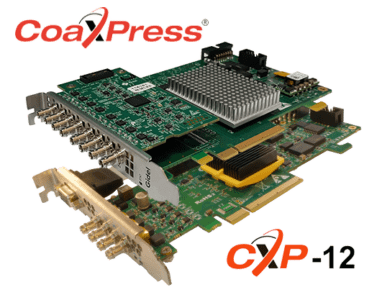High-end frame grabber manufacturer delivers new line featuring 8 links of cXp12, lossless and JPEG encoders at 500+ MPixels/second, and the ability to support customized FPGA ISP.
Gidel, a technology leader in cutting-edge Vision and Imaging solutions based on FPGAs, today announced a new line of frame grabbers that double the bandwidth of any other grabber on the market. The Proc10A cXp12 and HawkEye_cXp12 are both based on Arria 10 FPGAs and deliver tremendous real-time processing capacity and memory resources, supporting up to eight PoCXP12 links to provide up to 100 Gb/s throughput (10,000 Mb/s). The Proc10A cXp12 enables the use of eight 500+ MPixels/s lossless and JPEG encoders, doubling the pixel frequency of each encoder over that of similar products. The higher-end grabber can process at least as fast as 2 GPixels/s per camera.
Both frame grabbers fully support Line Scan and Area Scan cameras, as well as GenICam. They utilize Power-Over CoaXPress (PoCXP) and offers on-board memory of up to 34 GB, significantly larger than can be found elsewhere. The grabbers’ extremely compact compression encoders, in combination with Gidel’s InfiniVision, deliver the most effective recording system available, capable of synchronizing more than 100 cameras / sensors.
Gidel’s CoaXPress 12 grabbers’ APIs allow them to handle separate programs/processes in online machine vision processing and recording systems in parallel, with compression for the recording system handled right on the grabber, making the products uniquely suited for machine vision applications with the need to keep original data. The products are ideal for use in high-end machine vision, industrial inspection/ automation, broadcast, medical imaging, and more.
“Gidel’s ability to deliver eight cXp12 links, process data right on the grabber, and compress data on the fly reduces the number of grabbers and computers needed per task, as well as the camera system’s overall power consumption,” says Ofer Pravda, VP Marketing & Sales at Gidel. “Our ultra-high bandwidth allows acquisition from high-end cameras at hundreds of frames per second, thus representing a huge savings in both cost and footprint for large-scale systems.”
Like all Gidel products, this new line of grabbers and their image processing capabilities can be fully customized to create unique Vision flows. Users are able to:
- Tailor protocols to proprietary cameras, including the ability to change the frame size and format for every frame
- Accelerate Image Signal Processing (ISP) via the grabber’s FPGA by using their own unique IPs in combination with desired Gidel IPs and templates, including optional lossless and other compression so that data can be processed offline
- Customize their cost / performance outcomes with a range of grabbers, from low cost options to higher-end grabbers that offer 1.15 million Logic Elements (LEs) for ISP — a far larger amount than any other frame grabber can support
As Gidel provides much of the core infrastructure required for Vision applications, users can quickly get started with building their own FPGA vision flows. Gidel’s frame grabbers are supported by the company’s ProcVision Kit, which allows users to tailor their vision flows in an intuitive and simple manner by customizing both the software and the FPGA design code for different frame grabbing flavors. The developer’s kit enables automatic generation of Application Support Packages (ASPs), and includes Gidel’s CamSim (camera simulator) as well as tools for debugging and verifying FPGA image processing IPs that will be released next month.
“Today’s applications use faster and higher resolution cameras, and thus require higher bandwidth in both grabbing and processing, so Gidel has combined CoaXPress 12 with a variety of development tools to overcome these limits by tailoring the solution to the application needs,” says Reuven Weintraub, Founder and CTO, Gidel. “One example of reducing the requested PCIe bandwidth and host processing is to combine feature extraction in FPGA with storing all image data to the grabber memory, while using the ProcFG API to grab only the relevant Regions Of Interest (ROI)s for further processing on the host. The grabbers’ compression encoders can also reduce the required bandwidth.”
The Proc10A cXp12 and HawkEye_cXp12 are available now for purchase. In order to further assist its customers Gidel also offers ODM services, such as developing the FPGA control, data flow, and processing. For more information, see www.gidel.com/frame-grabbers.

